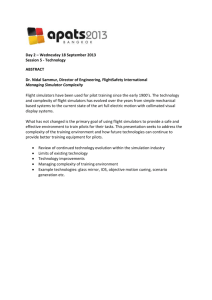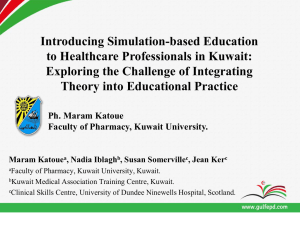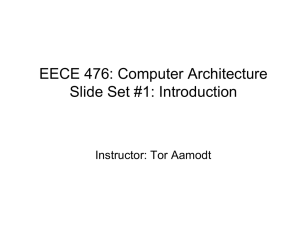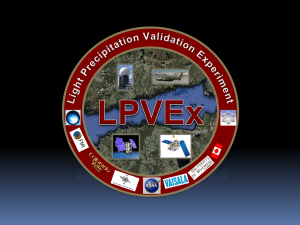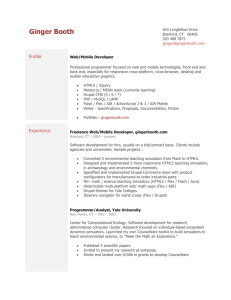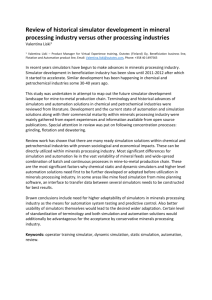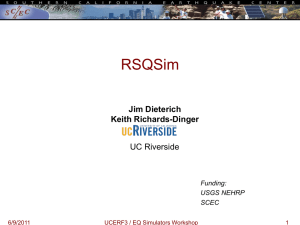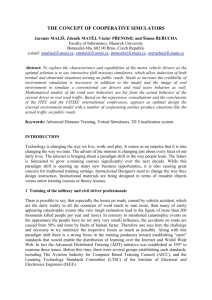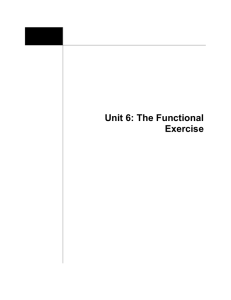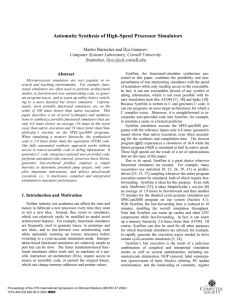ETRAproposal
advertisement
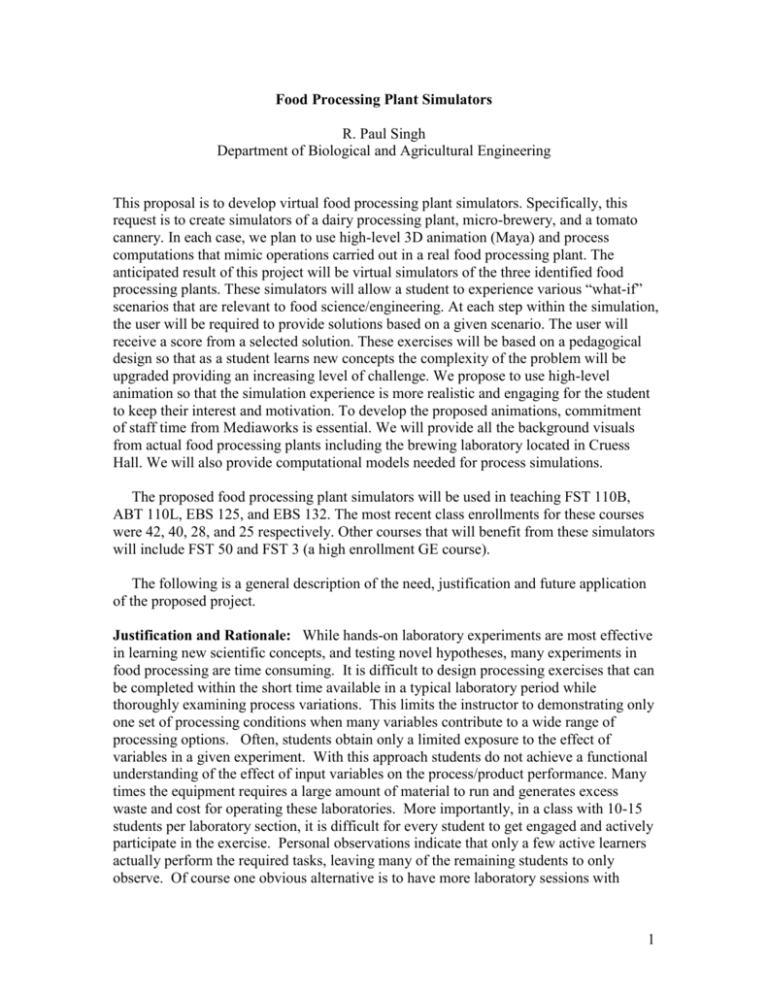
Food Processing Plant Simulators R. Paul Singh Department of Biological and Agricultural Engineering This proposal is to develop virtual food processing plant simulators. Specifically, this request is to create simulators of a dairy processing plant, micro-brewery, and a tomato cannery. In each case, we plan to use high-level 3D animation (Maya) and process computations that mimic operations carried out in a real food processing plant. The anticipated result of this project will be virtual simulators of the three identified food processing plants. These simulators will allow a student to experience various “what-if” scenarios that are relevant to food science/engineering. At each step within the simulation, the user will be required to provide solutions based on a given scenario. The user will receive a score from a selected solution. These exercises will be based on a pedagogical design so that as a student learns new concepts the complexity of the problem will be upgraded providing an increasing level of challenge. We propose to use high-level animation so that the simulation experience is more realistic and engaging for the student to keep their interest and motivation. To develop the proposed animations, commitment of staff time from Mediaworks is essential. We will provide all the background visuals from actual food processing plants including the brewing laboratory located in Cruess Hall. We will also provide computational models needed for process simulations. The proposed food processing plant simulators will be used in teaching FST 110B, ABT 110L, EBS 125, and EBS 132. The most recent class enrollments for these courses were 42, 40, 28, and 25 respectively. Other courses that will benefit from these simulators will include FST 50 and FST 3 (a high enrollment GE course). The following is a general description of the need, justification and future application of the proposed project. Justification and Rationale: While hands-on laboratory experiments are most effective in learning new scientific concepts, and testing novel hypotheses, many experiments in food processing are time consuming. It is difficult to design processing exercises that can be completed within the short time available in a typical laboratory period while thoroughly examining process variations. This limits the instructor to demonstrating only one set of processing conditions when many variables contribute to a wide range of processing options. Often, students obtain only a limited exposure to the effect of variables in a given experiment. With this approach students do not achieve a functional understanding of the effect of input variables on the process/product performance. Many times the equipment requires a large amount of material to run and generates excess waste and cost for operating these laboratories. More importantly, in a class with 10-15 students per laboratory section, it is difficult for every student to get engaged and actively participate in the exercise. Personal observations indicate that only a few active learners actually perform the required tasks, leaving many of the remaining students to only observe. Of course one obvious alternative is to have more laboratory sessions with 1 smaller numbers of students but this significantly increases commitments on instructor time and equipment that must serve multiple roles including research. In particular, this project will address the increasing time, space and cost constraints associated with teaching laboratory courses in food science/engineering. We plan to show that virtual food plant simulators can complement or substitute for limited, highcost, food processing equipment, improve students’ active learning and more efficiently use laboratory and class time. We anticipate the overall impact will be the improvement of undergraduate education in food science/engineering to better meet the required core competencies (for accreditation) in principles of engineering and food processing. We believe that the results of this project will show the effectiveness of virtual experiments and process simulations in conjunction with traditional laboratory exercises. The simulations will allow the students to develop higher level cognitive skills to analyze and evaluate processing systems. The concept of virtual simulations as substitutes for hands-on laboratories could also be used in distance learning courses. In this application, virtual simulations could improve the quality of instruction in any of the agricultural sciences where distance learning courses are being developed. Singh and Erdogdu (Virtual Experiments in Food Processing, 2004 RAR Press) developed several virtual experiments of individual food processing operations. These experiments have been routinely used in ABT 110L for the past three years. Based on the experience to date, students in this course using virtual experiments are more engaged in the laboratory exercises. Observations also reveal that the software minimizes the time required for actual laboratory experiments since the students could quickly generate virtual experiment data and analyze that data as if it were collected in the laboratory. This approach changes the students’ focus during the lab time from collecting data in the time allotted to understanding how the process worked, the principles involved and identifying which parameters should affect the process outcome. The creative approach in this proposal is to use virtual food plant simulators to improve understanding of food engineering and processing principles while reducing the cost and time required for laboratory experiments. We plan to evaluate various options for implementing the virtual simulators and show the effectiveness of the options in meeting the core competencies identified by accreditation agencies. Specific Objectives: a. To develop and implement food processing plant simulators to be used in junior/senior level courses in food processing and engineering b. To evaluate the effectiveness of the simulator concept when used in conjunction with limited conventional laboratory exercises or as a complement to lecture when equipment is not available Implementation: 2 The primary implementation approach will be to use simulators in conjunction with lecture and laboratory experiments. In a laboratory, students will run an actual process using a limited number of operating conditions followed by each student generating their own set of additional data using the process simulator. This simulator output can then be analyzed as if it were real data so that students can determine the effects of operating conditions on the results. In an effort to improve learning of food processing topics, the overall assessment goal is to better understand factors that affect the effectiveness and perceived quality of the simulators within food processing courses. The following assessments will provide insight into changes in students’ conceptual understanding of food processing topics with and without simulator intervention. To ensure accurate measurement of conceptual changes, we will assess students in both control and simulator groups by giving a preand post test. This assessment approach allows the calculation of a conceptual change score for both experimental and control groups. Comparing these scores will be the basis for determining the effectiveness of the simulators on eliciting improved prediction and evaluation ability. In summary, the proposed virtual food processing plant simulators are intended to enhance student’s learning experience. Based on the results of this project, we will seek future support from the USDA Higher Education Challenge Grant program. 3
